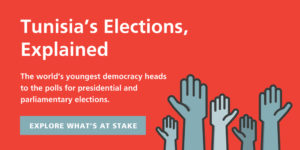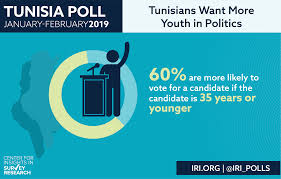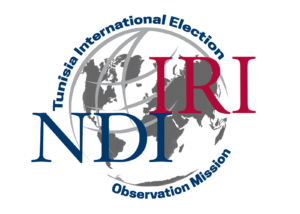This weekend, #Tunisia will hold its presidential runoff. The victor must work to make democracy deliver for a frustrated electorate. @IRIglobal’s @PatriciaJKaram outlines key issues #Tunisia’s next leader will face https://t.co/ZyvpniWV8T #TnElec2019 pic.twitter.com/XS9JCZRBmG
— IRI (@IRIglobal) October 11, 2019
Tunisia’s vote for president on Sunday is the next step in its bumpy transition to democracy after a revolution that triggered the “Arab Spring” uprisings of 2011, Reuters reports.
In exile, and now in death, former Tunisian dictator Zine el-Abidine Ben Ali continues to cast a shadow over this North African nation, the only nation in the region to emerge as a functioning democracy afterward, the Washington Post reports. In some corners, Tunisians yearn for Ben Ali’s rule — not out of any fondness for authoritarianism, but because it was the last time many felt a sense of stability, even though it was imposed by repression and surveillance, writes

POMED
But among many Tunisians, the nostalgia for Ben Ali’s regime “is counterbalanced by a greater sense that Ben Ali was a corrupt leader who oversaw the torture and imprisonment of his people and got away easy by living out his life in exile in Saudi Arabia,” said Sarah Yerkes, a Middle East expert at the Carnegie Endowment for International Peace.
As Tunisia heads toward the final round of its presidential election on October 14, no one knows whether constitutional lawyer Qaïs Sa‘id or media mogul Nabil Qaraoui (released from jail with corruption charges still pending) will win—an amazing thing in an Arab country, notes Carnegie analyst Michele Dunne. Sa‘id has no party, but has been endorsed by the Ennahda Party, which won 52 out of 217 seats in parliamentary elections on October 6. Qaraoui’s Qalb Tunis party won 38 seats, suggesting that the government formation process might be challenging, she writes for Diwan:
Whichever way it goes, democracy is being consolidated in Tunisia, where there is now a highly competent independent electoral authority and citizens for whom voting is becoming an established habit. As an international observer of the parliamentary elections, I was impressed by the evident commitment of poll supervisors to the integrity and transparency of the process, and touched by the enthusiasm of elderly voters as well as the calm confidence of youths in exercising their rights.

Carnegie
As a Tunisian civil society worker said to me, Dunne adds, “We have an older generation that is still amazed that it can elect its representatives, and a younger generation for whom this has become normal and expected.”
Delayed reforms, controversial economic bills, and other factors led voters to reject establishment politicians of all stripes, suggesting that Tunisians are moving beyond Islamist politics, analyst Dhia Otay writes for the Fikra Forum.
“Tunisians are looking for people seen as not part of the system and who are promising new ideas, because it hasn’t worked out with those that went before them,” says Youssef Cherif, an analyst and head of Columbia Global Centers-Tunis. “Populism is in our national mood.”

International Republican Institute
Regardless of who wins this Sunday’s election, the priority of the next president and the next government must be to deliver on economic reform and reawaken Tunisian people’s interest in politics, particularly that of the youth, argues IRI MENA Regional Director Patricia Karam. This means engaging the young generation and tackling urgent economic issues such as sustained growth and job creation, without borrowing from the future. Left unresolved, these problems will fester and strain Tunisia’s young democratic institutions.
The joint Election Observation Mission (EOM) of the National Democratic Institute (NDI) and International Republican Institute (IRI) will be led by Maureen White, a Senior Fellow in the Foreign Policy Institute at Johns Hopkins University; Scott Mastic, Vice President for Programs at IRI; and Leslie Campbell, NDI Middle East and North Africa director.
The delegation will maintain a Tunisia Election Portal during the mission with its latest observations and issue a preliminary statement on Monday, October 14, 2019 at 3:00 p.m. CET at the Movenpick Hotel Du Lac Tunis.
 The following is the full list of delegates participating in the IRI/NDI joint international Election Observation Mission:
The following is the full list of delegates participating in the IRI/NDI joint international Election Observation Mission:
- Maureen White, Senior Fellow in the Foreign Policy Institute at the Paul H. Nitze School of Advanced International Studies (SAIS), Johns Hopkins University
- Scott Mastic, Vice President for Programs, IRI
- Les Campbell, Senior Associate and regional director for the Middle East and North Africa, NDI
- Franck Diea, Member of the Platform of Civil Society Organizations for Election Observation, Côte d’Ivoire
- Trevor Fearon, Chief Executive Officer, Jamaica Chamber of Commerce
- Clay R. Fuller, Principal, NexusFX, LLC
- Rudolph Granier, Mali Resident Program Director, IRI
- Emily Harding, University College London, Former NDI Tunisia Political Party Director
- Jodi Herman, Vice President for Government Relations and Public Affairs, National Endowment for Democracy
- Jake Jones, Jordan Country Director, IRI
-

POMED
Brian C. Keeter, Director of Communications and Federal Government Relations, Auburn University
- Lukasz Kondraciuk, Eurasia Program Director, IRI
- Monika LeRoy, Advisor, Secretary-General of the Organization of American States
- Ilina Mangova, Macedonia Program Director, IRI
- Barton W. Marcois, Former Principal Deputy Assistant Secretary, Office of Policy and International Affairs
- Kamel Meziani, Algeria Program Manager, NDI
- Jan Nico van Overbeeke, former NDI resident director in Niger
- Pearl Pillay, Managing Director, Youth Lab
- Zabe Shafi, Middle East and North Africa Program Officer, NDI
- Leo Spaans, Tunisia Resident Director, NDI
- Djordje Todorovic, Tunisia Country Director and Senior Political Parties Advisor, IRI
- Ashleigh Whelan, Iraq Resident Program Director, IRI
- Lindsay Workman, Senior Advisor for the Middle East and North Africa, NDI







